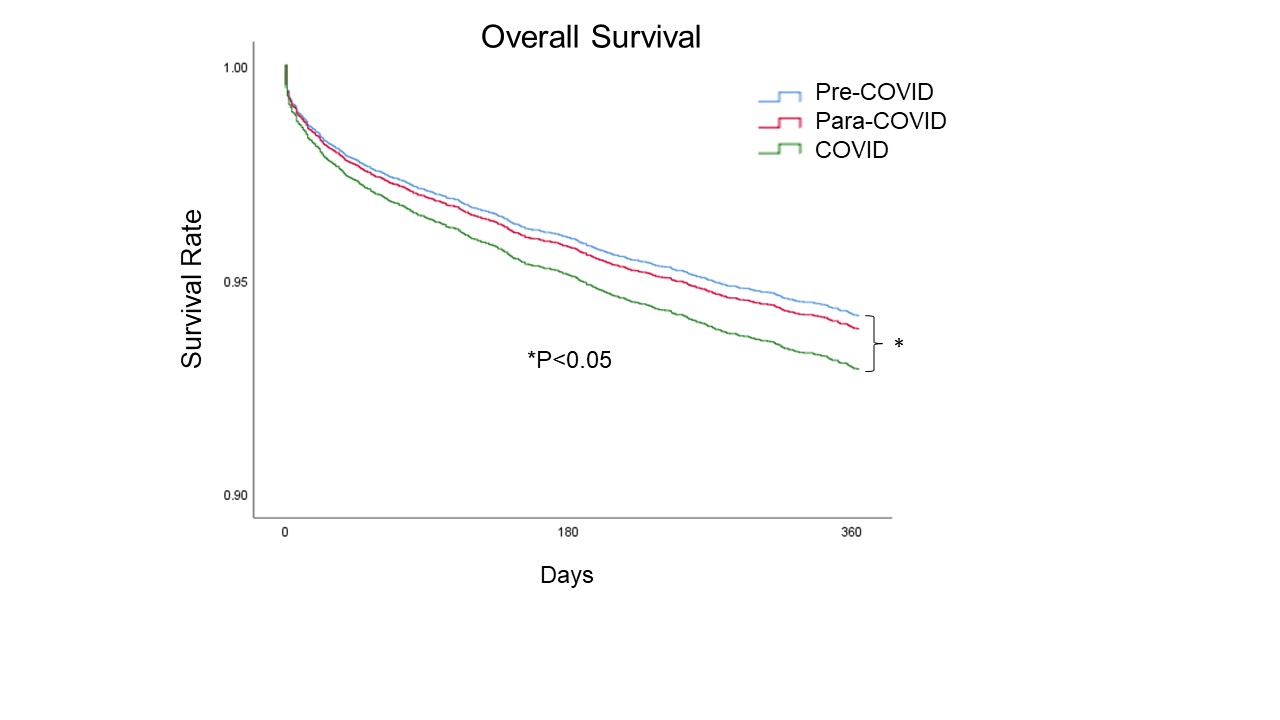Impact of COVID-19 on Increased Mortality in Liver Transplant Recipients in United States
K. Okumura, A. Dhand, R. Misawa, H. Sogawa, R. Bodin, D. C. Wolf, S. Nishida
Westchester Medical Center / New York Medical College, Valhalla, NY
Meeting: 2022 American Transplant Congress
Abstract number: 1340
Keywords: COVID-19, Liver transplantation, Mortality
Topic: Clinical Science » Infection Disease » 24 - All Infections (Excluding Kidney & Viral Hepatitis)
Session Information
Session Name: All Infections (Excluding Kidney & Viral Hepatitis) III
Session Type: Poster Abstract
Date: Monday, June 6, 2022
Session Time: 7:00pm-8:00pm
 Presentation Time: 7:00pm-8:00pm
Presentation Time: 7:00pm-8:00pm
Location: Hynes Halls C & D
*Purpose: COVID-19 pandemic has had a significant impact on access to routine healthcare in both hospitalized and out-patient settings. This impact was also noted in various aspects of pre and post-transplant care of liver transplant (LT) recipients. The aim of our study was to analyze the direct and indirect impact of COVID-19 on mortality in patients with recent LT.
*Methods: We retrospectively analyzed 30-day, 6-month and 1-year mortality data from the UNOS database in adult LT recipients from 3 distinct groups; Pre-COVID (March 11- September 10, 2019: LT and immediate follow-up care before pandemic), Para-COVID (September 11- March10, 2020: LT before pandemic and follow-up care during pandemic), and COVID (March 11- September 10, 2020: LT and follow-up care during pandemic).
*Results: 12,598 LTs were performed during the study period. During COVID period, there was increase in LT for alcoholic liver disease, average MELD score was higher, LT for hepatitis C decreased, use of thymoglobulin induction decreased and waiting time was shorter. During the 30-day period, overall mortality between 3 groups remained same. In the COVID group, mortality from graft failure was higher (7.4 vs 17.9%, p=0.07), rate of infection was lower (14% vs 4.2%, p=0.039), and incidence of graft rejection prior to discharge was higher. During the 6-month follow-up, overall mortality, mortality from malignancy and COVID, and graft failure increased significantly in the COVID group. During the 1-year follow-up period, mortality was highest in COVID group over para-COVID group and lowest in the pre-COVID group. In the COVID group, increased mortality was from graft failure and COVID. Overall mortality in the study cohort directly from COVID was 7.8%, which was highest in the COVID group. Multivariable cox regression for one year mortality showed that risk factors for mortality were COVID period [Hazard Ratio (95%CI) 1.22 (1.02-1.46), p=0.027], older age of recipient, diabetes, portal vein thrombosis, ventilation at the time of transplant, hemodialysis at the time of transplant, re-transplant, and prolonged cold ischemic time.
*Conclusions: COVID-19 significantly impacted LT short term outcomes with increased mortality seen from COVID directly as well as indirectly. During COVID, cautious and lower use of immuno-suppression was likely associated with higher rates of rejection and lower rates of infection. Disruptions in routine post-transplant follow-up likely contributed to increased death from graft failure, malignancy, and poor control of chronic medical conditions like diabetes.
To cite this abstract in AMA style:
Okumura K, Dhand A, Misawa R, Sogawa H, Bodin R, Wolf DC, Nishida S. Impact of COVID-19 on Increased Mortality in Liver Transplant Recipients in United States [abstract]. Am J Transplant. 2022; 22 (suppl 3). https://atcmeetingabstracts.com/abstract/impact-of-covid-19-on-increased-mortality-in-liver-transplant-recipients-in-united-states/. Accessed February 25, 2026.« Back to 2022 American Transplant Congress

